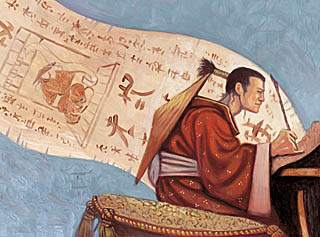 The Emerald Empire of Rokugan. It is a land upheld by honor, guided by fate, ruled by destiny. The Great Clans each support the Emperor, but inter-clan conflict is inevitable—both in the Emperor’s courts and on the battlefield. In the midst of danger and turmoil, honor must be your sword and your armor.
The Emerald Empire of Rokugan. It is a land upheld by honor, guided by fate, ruled by destiny. The Great Clans each support the Emperor, but inter-clan conflict is inevitable—both in the Emperor’s courts and on the battlefield. In the midst of danger and turmoil, honor must be your sword and your armor.From the Shadowlands in the south to the Burning Sands in the north, from the Twilight Mountains in the west to the Islands of Spice and Silk in the east, Rokugan, the Emerald Empire, has stood for over one thousand years thanks to the seven Great Clans who serve the Emperor. As guardians and politicians, each clan fulfills their role in society and are as varied as they are powerful. But all are bound by the same code of honor, the way of the warrior, the code of Bushido. Honor is valued above all else, and a misspoken remark can be just as fatal as an enemy’s blade.
It is in this context that the clans battle. From the ancient rivalry of the Crane and Lion to the Crab’s daily skirmishes with the Shadowland forces always threatening to extend their reach into Rokugan, the clash of swords and pull of politics is a daily occurrence.
But while conflict between the clans has dominated Rokugan for over one thousand years, the true threats await in the dark, known only to a few. The five elements of Air, Earth, Fire, Water, and Void are in a precarious balance, and the land of Rokugan teeters on the brink of chaos.
The Story So Far…
It is an era of sudden change and upheaval in the Emerald Empire. Mortal schemes, elemental imbalances, and celestial turmoil have disrupted the political, military, and spiritual equilibrium of Rokugan. Long-simmering rivalries and fresh betrayals ripple through the courts and on the battlefield. The Chrysanthemum Throne is beset by threats from without and within, and the honor of the seven Great Clans shall be put to the test.
After a devastating tsunami strikes their coastal farmland, the Crane Clan balances on the precipice of famine and war. Doji Hotaru—the young Crane Clan Champion who grew up in the shadow of her father, the legendary Emerald Champion Doji Satsume—must defend her clan’s artistic legacy, political clout, and extensive borders with honor alone.
While the Crane have been laid low, the Scorpion Clan has ascended to the height of glory. The clan serves Emperor Hantei XXXVIII well: Bayushi Shoju as a trusted friend and his impossibly beautiful wife Kachiko, as Imperial Advisor. No word is whispered in the Imperial Capital that escapes the Scorpion Clan’s ears, and no plot is hatched that evades the notice of its agents.
The Scorpion maintain a tenuous alliance with the Lion Clan’s leader, Akodo Arasou, who seeks to carry out an age-old vendetta against the Crane at the side of his beloved, the warrior Matsu Tsuko. No army can withstand the ferocity and tenacity of the Lion’s warriors or the stratagems of the clan’s brilliant new general, Akodo Toturi.
The Lion’s unconventional neighbors, the Unicorn Clan, struggle to reconcile their foreign customs with the laws and traditions of Rokugan. Shinjo Altansarnai believes she has brokered a peace with the Lion Clan at last, but the fiery Utaku Kamoko may not be able to leash her hatred for the Lion, whom she believes murdered her mother.
The Phoenix Clan cast a wary eye on meishōdō, the talismanic name magic practiced by the Unicorn, and fear the imbalance that foreign sorcery has wrought among the spirits. Phoenix Clan Champion Shiba Ujimitsu must prepare to defend his clan’s borders while the prayers of the Phoenix’s mystical shugenja go awry. The Council of Elemental Masters cannot explain the disquiet affecting the elemental kami, and so they turn to forgotten or forbidden lore for answers.
In the secluded mountains of the far north, the Dragon Clan—beset by a failing birthrate and the surging popularity of a potentially dangerous and heretical sect of Shinseism—looks to the guidance of its enigmatic champion, Togashi Yokuni, to restore the clan’s enlightened way of life.
Amid this infighting, the largest and most dangerous Shadowlands army ever recorded marches on the great Carpenter Wall in the south. A combined force of goblins, ogres, undead, and legendary demons known as oni threaten to spread their darkness and destroy civilization in the name of Fu Leng, the fallen Kami. Hida Kisada of the Crab Clan and his children must gain the support of the entire Empire to turn back the tide of destruction or risk being broken beneath the evil Shadowlands onslaught.

